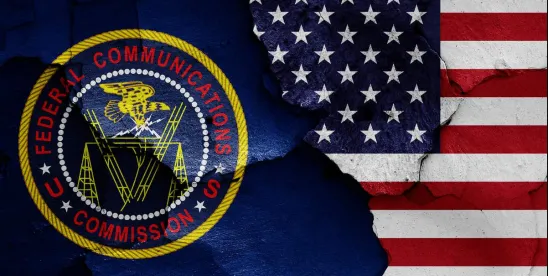The wireless industry has revolutionized the way we connect, from facilitating teleworking, distance learning, and telemedicine to allowing the American public to interact virtually in almost all other aspects of their daily lives. Leading policymakers – federal regulators and legislators – are making it a top priority to ensure that the wireless industry has the tools and resources it needs to keep pace with this evolving landscape. This blog provides monthly updates on actions by federal regulatory bodies responsible for communications policy and Congressional efforts to support wireless connectivity. And this month we highlight the FCC’s release of proposed changes to its rules governing the use of mid-band spectrum in the 3.5 GHz band for commercial wireless services.
Regulatory Actions and Initiatives
Spectrum
The FCC Re-Evaluates Use of the 3.5 GHz Band. On August 16, 2024, the FCC released a Notice of Proposed Rulemaking (“NPRM”) seeking comment on several proposed rule changes to Citizens Broadband Radio Service (“CBRS”) operations in the 3.55-3.7 GHz band (“3.5 GHz band”). Specifically, the FCC proposes modifying its rules to codify certain refinements to its CBRS spectrum sharing regime, particularly with respect to protecting federal incumbent users. It also proposes to update the technical parameters and service rules for CBRS operations, including by (i) clarifying the information disclosure requirements for Citizens Broadband Service Device (“CBSD”) registrations; (ii) aligning out-of-band emissions limits with those for adjacent bands; (iii) imposing procedures on CBRS licensees for coordinating with adjacent-band operations; (iv) updating protection measures for certain Fixed Satellite Service earth stations; and (v) sunsetting rules related to the grandfathered wireless broadband license transition. Finally, the FCC asks whether it should address the professional installation requirement for CBRS equipment and the deployment of private networks and low-power indoor facilities, and it asks how to best facilitate General Authorized Access user coexistence. In a News Release accompanying the NPRM, the FCC notes that the NPRM seeks to improve CBRS for “all current and future users” and evidences the FCC’s “commitment to develop innovative, collaborative mechanisms to facilitate greater spectrum use.” Comments and reply comments will be due 30 and 60 days, respectively, after the NPRM is published in the Federal Register.
In addition, attached to the NPRM is a Declaratory Ruling, clarifying that the National Telecommunications and Information Administration (“NTIA”) and the Department of Defense (“DoD”) are not “the general public” for purposes of the FCC’s CBRS information disclosure rules.
The FCC Adopts Rules Enabling Drone Operations in the 5 GHz Band. On August 29, 2024, the FCC released an Order adopting new rules to permit unmanned aircraft system (“UAS”) (i.e., drone) operators to access dedicated spectrum in the 5030-5091 MHz band. Under the new rules, drone operators can obtain direct frequency assignments in the band for wireless communications necessary to safely control drone flights. The FCC notes that it intends to address the following issues in later phases of the proceeding: (i) the final band plan for the 5030-5091 MHz band; (ii) measures to ensure compatibility between UAS stations operating at and near the edges of the 5030-5091 MHz band and services in adjacent spectrum; and (iii) service rules for exclusive-use licenses enabling network-supported services in the band, including the scope of such services. In a News Release accompanying the Order, Chairwoman Rosenworcel notes that the FCC “will continue to work with [its] public and private partners to support the best outcomes for public safety, wireless services, consumers, and our economy.”
The FCC Provides Federated Wireless Relief Due to Severe Weather. The FCC’s Wireless Telecommunications Bureau (“WTB”) released multiple Orders granting Federated Wireless emergency waivers of the FCC’s rules that require Environmental Sensing Capabilities (“ESCs”) in Dynamic Protection Areas (“DPAs”) to detect and protect federal incumbent users in the 3.5 GHz band from harmful interference. First, in the wake of Tropical Storm Debby, the WTB released an Order granting Federated Wireless’s request to treat certain DPAs in Florida as “inactive” for the duration of the waiver authority, relieving Federated Wireless’s ESCs of the detection requirement. Second, in response to Hurricane Ernesto, the WTB released an Order granting Federated Wireless’s request to treat certain DPAs in Puerto Rico as “inactive” for the duration of the waiver authority, relieving its ESCs of detection obligations. The WTB noted that grant of the waivers will allow Federated Wireless to provide uninterrupted service to thousands of CBRS devices that provide critical broadband, voice, and data services. Like prior waiver Orders, the WTB imposed certain conditions, including requiring Federated Wireless to provide confirmation to the FCC, the DoD, and the Navy within three business days of power restoration to the subject ESC sensors and restoration of backhaul service. Federated Wireless must also immediately activate the subject DPAs upon notification from the FCC, NTIA, or the DoD.
The FCC Seeks to Further Develop the Record on Millimeter Wave Spectrum. On August 9, 2024, the WTB released a Public Notice seeking to further develop the record with respect to the potential use of the 37-37.6 GHz band (the “Lower 37 GHz band”). Noting that commenting parties previously suggested the spectrum band could be used for, among other things, fixed wireless broadband, point-to-point links, Internet of Things networks, device-to-device operations, augmented reality applications, smart cities, smart grids, and as part of private networks, the WTB asks for interested operators to provide “specific and updated information” on the contemplated uses of the band, including interdependencies of pairing spectrum bands with the Lower 37 GHz band. Comments are due September 9, 2024.
The FCC Requests Comments on Use of the 18 GHz Band. Multiple FCC bureaus issued a Public Notice on August 16, 2024, seeking comment on potential use cases for the 18.1-18.6 GHz band. The deadlines for submitting comments and reply comments in response to the Public Notice are September 5, 2024, and September 16, 2024, respectively.
Wireless Services
The FCC Opens an Inquiry on Customer Service Practices. On August 12, 2024, the FCC issued a News Release announcing that Chairwoman Rosenworcel has circulated among her fellow Commissioners a Notice of Inquiry that would, if adopted, seek information on the customer service practices of phone, cable, and broadband service providers. The purpose of this inquiry is to determine whether and how to make the customer service experience more efficient so that the savings can be passed down to consumers. Although a draft of the Notice of Inquiry has not yet been made publicly available, the News Release notes that it would seek comment on the following topics, among others:
- Simple cancellation;
- Access to live representatives;
- Establishing uniform requirements regarding installations, outages, and service calls;
- Automatic renewal of service or price increases;
- Special considerations for people with disabilities, and more.
The FCC Takes Additional Steps to Support 5G Mobile Broadband Services in Rural Areas. The FCC released its Second Report and Order and Second Further Notice of Proposed Rulemaking on the 5G Fund on August 29, 2024. The FCC previously determined that, under Phase I of the 5G Fund, the FCC will use a multi-round reverse auction to distribute up to $9 billion to support the deployment of voice and 5G mobile broadband service to rural areas. The Second Report and Order resolves various outstanding issues in this proceeding, including the areas eligible for support and requirements related to cybersecurity and supply chain risk management plans, so that the FCC may proceed with an auction. According to this News Release, the FCC will announce the expected start of the auction later through a Public Notice.
Wireless Networks and Equipment
The FCC Announces Prohibition on Authorization of Equipment Produced by Kaspersky. On September 3, 2024, the FCC’s Office of Engineering and Technology (“OET”) and Public Safety and Homeland Security Bureau confirmed that cybersecurity and anti-virus software produced or provided by Kaspersky Lab, Inc. (“Kaspersky”), including any of its successors or assignees, poses an unacceptable risk to the national security of the United States or to the security and safety of American consumers. Kaspersky therefore has been added to the FCC’s Covered List, and, going forward, any piece of equipment that integrates Kaspersky cybersecurity or anti-virus software is prohibited from obtaining equipment authorization from OET. Moreover, unauthorized equipment may not be imported or marketed within the U.S.
The FCC Grants Additional Relief to Rip-and-Replace Support Recipients. The FCC’s Wireline Competition Bureau released a Public Notice on August 29, 2024 announcing that it has granted five requests for extension of support recipients’ rip-and-replace deadlines. The grant of these requests continues to be based on funding and supply chain issues.
Comment Deadlines Established on the FCC’s Handset Unlocking Proposals. The FCC’s Notice of Proposed Rulemaking seeking comment on whether the FCC should subject wireless services providers, including resellers, to certain handset unlocking requirements was published in the Federal Register on August 8, 2024. Accordingly, comments and reply comments will be due September 9, 2024, and September 23, 2024, respectively.





 />i
/>i

